08.02.16
Posted in America, Apple, IBM, Patents, SCO at 9:07 am by Dr. Roy Schestowitz
Even East Texas, which advertises itself as plaintiff- and troll-friendly, might not tolerate software patents for much longer
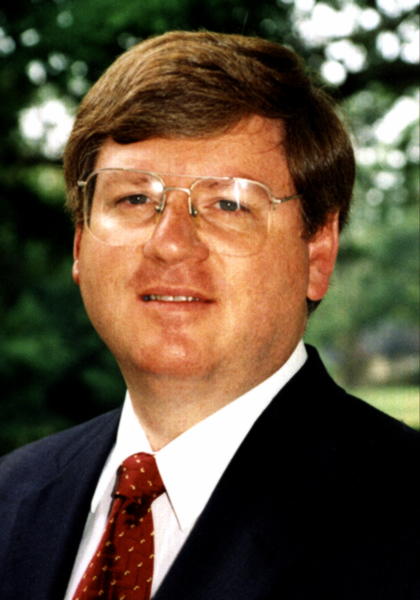
Summary: Examining some of the latest software patents that make this week’s headlines and what we can learn from these
SOFTWARE patents are dying in the US, owing largely to § 101 (post-Alice). Patent lawyers, as expected, are in denial about it (misleading customers in order to maintain demand) and there is a new article today/this week about § 101 analysis. Mentioned therein is a “conclusion that the claims at issue fail to meet the standard for patent eligibility under § 101.”
“The significance of this outcome is that once again (as before) we see software patents — once challenged enough, scrutinised properly and reassessed sufficiently — falling short.”The de facto ban on “abstract” software patents (that ought to cover all software patents) does not deter everyone, especially not deep-pocketed companies which simply hoard thousands (if not tens of thousands of patents) and then cross-license or shake down companies in bulk. According to dozens of news reports from yesterday (e.g. [1, 2, 3]), Amazon continues to patent software (this patent for audio surveillance) and today we learn that Disney tries patenting foot surveillance in parks. Talk about lack of ethics… Amazon has pushed software patents as far as Europe in spite of the clear exclusions.
As we mentioned here briefly at the start of this week, VirnetX's software patent attack on Apple is falling short, as does the stock of VirnetX [1, 2, 3, 4, 5, 6]. VirnetX is a patent troll whose existence (or worth) is little more than software patents, so the loss of the case (or at least a $625,000,000 award) was big news yesterday [1, 2, 3, 4, 5, 6, 7, 8, 9, 10, 11, 12, 13, 14, 15], not just in Apple-centric sites.
The significance of this outcome is that once again (as before) we see software patents — once challenged enough, scrutinised properly and reassessed sufficiently — falling short. Time to leave East Texas for a balanced venue? It’s probably a waste of time (and money) trying to assert these patents in a court of law, especially against large companies that can afford to withstand/endure lots of motions and appeals. That’s why the main victims of software patents (and patent trolls) are small businesses; they would often settle rather than risk the high cost of never-ending legal proceedings. The SCO case has gone on for 13 years because IBM can afford this and SCO, whose only remaining existence is this one case, goes to the grave (well past bankruptcy) in a desperate effort to extract some money (much like VirnetX).█
Permalink
 Send this to a friend
Send this to a friend
Posted in America, Europe, Patents at 8:31 am by Dr. Roy Schestowitz
A “licence to kill”? What is this, a James Bond movie?
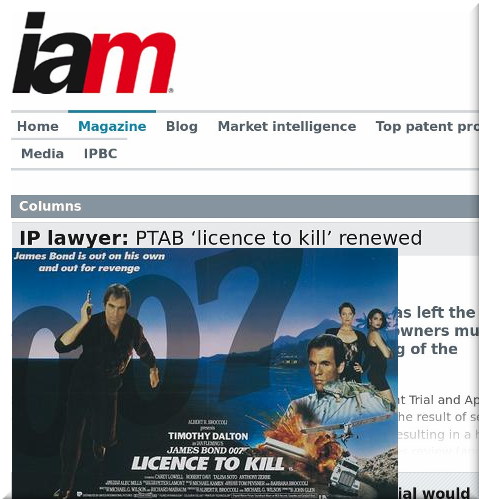
Summary: The patent microcosm has reached the verge of the pathetic with its attacks on the Patent Trial and Appeal Board (PTAB), which is invalidating software patents and other abstract patents at a high pace (correcting the mistakes of the grant-happy Patent Office)
PTAB, an integral part of AIA, is incredibly popular among practicing professionals, unlike beaurocrats like lawyers who make money out of feuds (not production).
A self-described “IP lawyer”, writing about Cuozzo [1, 2, 3, 4] for the EPO‘s mouthpiece, demonises PTAB using the typical characterisation (“attacks”, “kills”, “death squad”) in the piece “PTAB ‘licence to kill’ renewed” (what next? Will they call the Boards of Appeals too “death squads” and help Battistelli demolish these obstructions to rubber-stamping or “productivity” as Battistelli refers to rubber-stamping?) and a patent attorney who is afraid of PTAB (and uses similar characterisations on a daily basis) says that “CAFC’s EPG decision contrary to Diamond v Diehr-alarm activated is invalid under 101 (EPG) vs mold door opened.is valid (Diamond)” (invalid under § 101, as is usually the case these days).
“Reports of software patents dying at CAFC or PTAB can be found every week (if not every day) because software patents are a dying breed in the US, thanks primarily to Alice.”Speaking of CAFC, Patently-O writes about it this week in relation to definiteness standard. It says that “[t]he Patent Act requires that claims be written in a way that “particularly point[s] out and distinctly claim[s] the subject matter which the inventor . . . regards as the invention.” 35 U.S.C. 112(a). In Nautilus, the Supreme Court held that a patent claim survives this test only if it provides “reasonable certainty” as to the scope and bounds of the invention.”
Sloppy patent applications are bound to incur the Supreme Court’s (SCOTUS) wrath and one has to wonder how many shoddy patents that USPTO examiners let through the sieve are basically a worthless piece of paper.
It is apparent that many software patents are no longer valid, whether they’re actually being challenged or not. Their value is close to zilch. CAFC‘s changing tune after SCOTUS ruled on Alice is noteworthy. We wrote about Diamond v Diehr many times over the years, e.g. [1, 2, 3, 4].
Reports of software patents dying at CAFC or PTAB can be found every week (if not every day) because software patents are a dying breed in the US, thanks primarily to Alice. █
Permalink
 Send this to a friend
Send this to a friend
Posted in Europe, Patents at 7:45 am by Dr. Roy Schestowitz
In the face of Brexit, despite the obvious barriers it creates, Team UPC (a conspiracy of patent lawyers looking to gain from the UPC and standing to profit at Europe’s expense) stubbornly lobbies the UK’s government
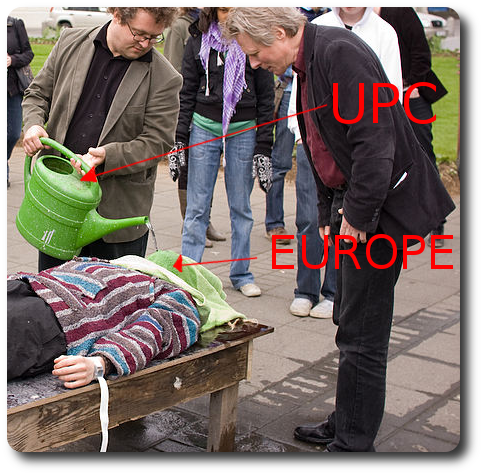
Reference: Waterboarding; “Photo from a protest against waterboarding, on the occasion of Condoleezza Rice’s visit to Iceland, by Campaign Against Military Bases. Condoleezza Rice was invited to the protest and to try waterboarding for herself but as she didn’t show some volunteers tried it out for themselves.” (Credit: Karl Gunnarsson)
Summary: The European public, and even those beyond or outside the EU, are subjected to deep-throating tactics by the patent microcosm (military–industrial complex equivalent), which is force-feeding everyone a system which serves nobody other than large (usually foreign) corporations, patent trolls, and of course their lawyers
THE EPO has not mentioned the UPC for weeks. The European media has not mentioned it for quite a while, either. Why? Because it’s dying. They know it; they almost gave up.
Patent lawyers and their convenient little 'cartel', on the other hand, pressure the British government and hope to shame it into ratifying the UPC without discussion, without public consent and without even assessing the post-Brexit situation. This morning MIP published a UPC “progress [sic] report” and said in its summary: “Protocol on Privileges and Immunities of the UPC signed; IP community puts pressure on the UK government; Preparatory Committee and Select Committee to continue with final preparations” (preparation for nothing, just pretense and self-fulfilling prophecy attempts).
“There are sadly not enough (little or none) sites that explain to the public what the UPC would mean to producing actors (like European SMEs), except few conglomerates that lobby for the UPC and sneakily hijack the voices of Europeans.”These people’s disdain for democracy is utterly contemptible. From start to finish the UPC has been an attempt to steal democracy and ram down people’s throats an undesirable system. There’s even ‘roadkill’ inside the EPO (like those resisting Battistelli’s EPO plot) and we are surprised that not more people speak out against the UPC (perhaps because they don’t understand it well enough, if at all). MIP says: “The Protocol on Privileges and Immunities of the UPC is an important legal instrument which safeguards the function of the UPC in the participating member states. The Protocol has now been signed by 13 member states excluding the UK, whose acceptance is required before it can enter into force.”
Last month we wrote about the role played by Battistelli’s ally Lucy Neville-Rolfe and it would be a shameful disgrace if she was allowed to interfere in the process (it is not unthinkable). In a new edition of IAM’s ‘magazine’ there is this article titled “Brexit leaves the UPC in limbo – and that’s no bad thing” (behind paywall). The editor has already stated, repeatedly, that it can take years (it not forever) for UPC to happen. He said this after he had spent years pushing for the UPC. Another article about this alluded to the piece behind the paywall, in which it’s summarised as follows: “The United Kingdom’s recent vote to leave the European Union is likely to have a significant impact on IP management strategies in Europe – some of which are explored in the Insight section – but what it won’t do is curb the growing enthusiasm that European patent owners are showing for the monetisation of their rights. Anders Arvidsson, Keith Woomer and Lucia Alvarado take a look at the current state of play in various European industries and predict how things may develop over the coming years. For anyone seeking to understand the dynamics of what is a highly complex market, this is essential reading.”
As one might expect, coming from a highly biased site that is funded in part by patent trolls and in this case composed by professional patent boosters, the analysis is more optimistic than elsewhere. There are sadly not enough (little or none) sites that explain to the public what the UPC would mean to producing actors (like European SMEs), except few conglomerates that lobby for the UPC and sneakily hijack the voices of Europeans. █
Permalink
 Send this to a friend
Send this to a friend
08.01.16
Posted in Europe, Patents at 6:09 am by Dr. Roy Schestowitz
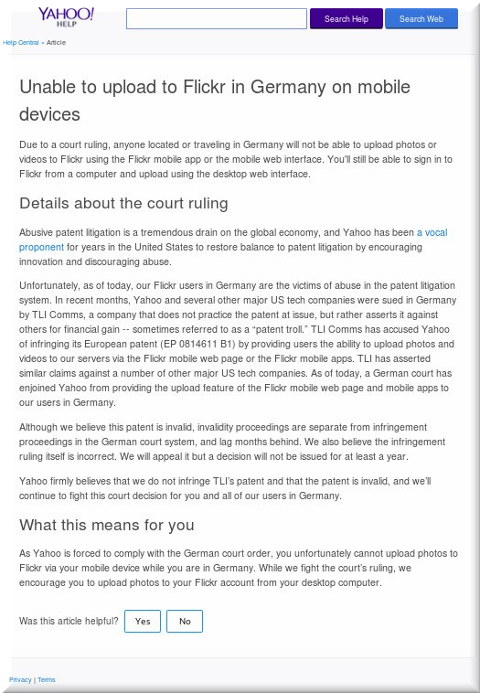
Summary: A reminder of the tough reality of patent scope in Europe, especially now that Battistelli embraces Chinese standards for patent quality (or lack thereof), in the name of perceived or faked “growth”
Team Battistelli has ruined the EPO and unless Battistelli and his cronies are ousted very soon, the damage may be irreversible. Already, as we noted over the weekend, the Office ignores the European Patent Convention (EPC) and disregards patent quality, so every day patents are being granted in error and there is no effective appeals process (understaffed and lacking capacity, afraid of Battistelli’s next collective punishment).
Yesterday, Benjamin Henrion and another person [1, 2] spoke about the effect of just one single patent troll on Flickr (part of Yahoo!) in Germany. It’s a software patent, so one might gasp and wonder how the heck it has any effect. In reality, Germany is the most software patents-friendly country in Europe, as we noted here in passing about 8 years ago and earlier this year.
“In reality, Germany is the most software patents-friendly country in Europe, as we noted here in passing about 8 years ago and earlier this year.”“With Unitary Software Patents and German judges,” Henrion added, “Europeans won’t be able to upload their pictures to Flickr…” (because the effect of the lawsuits would be widely applicable, more than just EU-wide).
“Facepalm,” wrote another person. “A patent troll is preventing German Flickr users to upload pictures from mobile apps. https://help.yahoo.com/kb/SLN26970.html”
They’re a little late in realising this. It’s rather old news (this was mentioned here before, two months ago), but it’s always good for reminding people that software patents are still a problem in Europe.
This has no remedy in sight and Battistelli already crushes the appeals process, so the same case can happen at the EPO and there is no effective oversight to overrule it.
Very soon “attending oral proceedings before the boards will come with an extra average 3 hours journey,” according to this new comment that says:
The site envisaged for the Boards of Appeal – Richard-Reitzner-Allee 8, 85540 Haar – is located at a 35 minutes ride from the airport, in theory. In reality, the trip uses one of the most crowded highway portions in Germany, including the A9 north of Munich and the peripheral highway A99 with its frequent traffic jams.
Alternately and more ecologically, there is a connection via the regional trains S8 and S4 with a change at the Leuchtenbergring station. Considering that it lasts 1 hour and 15 minutes one way, with one connection every 20 minutes only, attending oral proceedings before the boards will come with an extra average 3 hours journey in the Munich commuter trains.
A couple of rooms for oral proceedings mignt be enough, in the circumstances.
The threat of software patents in Europe is growing, whereas the USPTO goes in the opposite direction after the Supreme Court corrected decades of injustice. It’s not as if Battistelli has any notion of justice; his understanding of the term is the same as Recep Tayyip Erdoğan’s. █
Permalink
 Send this to a friend
Send this to a friend
Posted in America, Apple, Courtroom, IBM, Law, Patents at 5:45 am by Dr. Roy Schestowitz
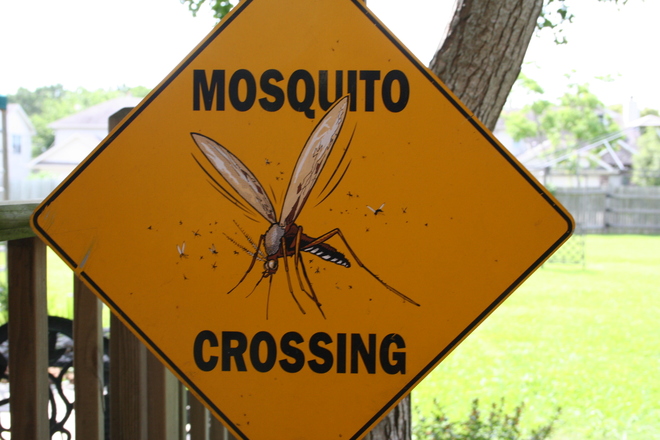
Summary: Software patent lawyers and software patent trolls are still active in the United States, even if the climate is unfriendly to them after the Supreme Court’s decision on Alice and § 101
WITH § 101 and Alice (2014), it’s now abundantly apparent that things have changed. It’s rather common for software patents to simply die, either at the courts or at PTAB. As patent trolls rely so heavily on software patents, they too are suffering and now there’s a plan for an “IPO Webinars on Section 101″. To quote a patent maximalism site: “The Intellectual Property Owners Association (IPO) will offer two one-hour webinars entitled “Section 101 – The Way Ahead”. The first webinar, concerning the impact of § 101 on the software industry, is being offered on August 10, 2016 from 2:00 to 3:00 pm (ET). Stephen Durant of Schwegman, Lundberg & Woessner, P.A.; Michelle Macartney of Intellectual Ventures, LLC…”
Well, Steven Lundberg's firm, which we last mentioned in April, is one of the worst offenders and one of the most vocal proponents of software patents. They even have a dedicated blog and lobbying on the matter. The world’s largest patent troll (and Microsoft’s troll) Intellectual Ventures taking part in pro-software patents event is also noteworthy. It really shows what the Intellectual Property Owners Association has been reduced to; it’s like a think tank for lobbyists, parasites and trolls.
“It’s rather common for software patents to simply die, either at the courts or at PTAB.”In writing about Technicolor, the trolls-funded 'news' site IAM did not bother mentioning that MPEG-LA is a parasitic patent troll. The editor, who wrote this article, denies that trolls exist (like people who deny climate change). MPEG-LA and related patent pools (mentioned therein and covered here in the past) pass a massive tax to the public, in the name of software patents even when these patents do not exist (and are not legitimate). Companies that latch onto MPEG-LA to extract revenue from the public are nothing but leeches. They don’t innovate, they just look for a patent troll like MPEG-LA to act as a proxy and bully any company which streams video (or helps stream video) without paying millions of dollars in unjust tax. Even Mozilla became a victim of this. What a waste of money for a FOSS company and a project like Firefox.
Speaking of trolls, IBM increasingly acts like one and it relies on software patents for this. Using the words “PTAB Attack” (another negative-sounding term like “killer” or “death squad”) a patent attorney wrote that “IBM’s Online Reservation Patent Survives PTAB Attack: https://dlbjbjzgnk95t.cloudfront.net/0822000/822630/ipr2016-00604_institution_decision_12.pdf”
“Companies that latch onto MPEG-LA to extract revenue from the public are nothing but leeches.”The cited PDF is 25 pages long and in it it’s “ORDERED that, pursuant to 35 U.S.C. § 314(a), an inter partes review is not instituted for claims 1–8, 11, 12, 14–21, 24, 25, 27–34, 37, 38, 40–45, 47–49, 51–57, and 60–66 of U.S. Patent No. 5,961,601.” The Petitioners are Richard Zembek and Gilbert Greene. The patent owner (or firm representing him/her/them) is Andrew Heinz and/or Kevin McNish.
What we have here is a reminder that PTAB is not always the ultimate remedy. Having said that, there are also the courts to fall back on, so if IBM resorts to lawsuits rather than just saber-rattling, the patent can still die (at very high cost to the defendant though, possibly lasting several years after a number of appeals).
The latest in a high-profile case against Apple suggests that VirnetX‘s patent lawsuit which it won against Apple isn’t the end of it because “TX Ct [Texas court] Vacated VirnetX $625M Award Against Apple; Ordered Two New Trials: https://dlbjbjzgnk95t.cloudfront.net/0823000/823395/https-ecf-txed-uscourts-gov-doc1-17518671566.pdf”
Texas again. It figures.
“What we have here is a reminder that PTAB is not always the ultimate remedy.”In other news, Patently-O wrote last night about Illumina’s battle against Ariosa Diagnostics. It’s one of those controversial patents on genetics (i.e. on life) and Professor Crouch wrote: “The essence of the conflict is whether Illumina’s U.S. Patent No. 7,955,794 is covered by the “Core IP Rights” licensed as part of a 2012 supply agreement. Illumina argues that ‘794 patent was not licensed and, when Ariosa refused to pay a license fee, sued Ariosa for patent infringement. Ariosa’s counterclaim of breach of contract and other covenants stem directly from the infringement allegations.”
Sadly, as seen above, there is a persistent (if not also growing) element of confrontation around software patents and other dubious patents because the USPTO lost touch with patent scope and granted nearly anything that came in — the same mistake that Battistelli now makes at the EPO. █
Permalink
 Send this to a friend
Send this to a friend
07.31.16
Posted in America, Australia, Deception, Europe, Patents at 9:47 am by Dr. Roy Schestowitz
This kind of rebranding strategy is nothing new
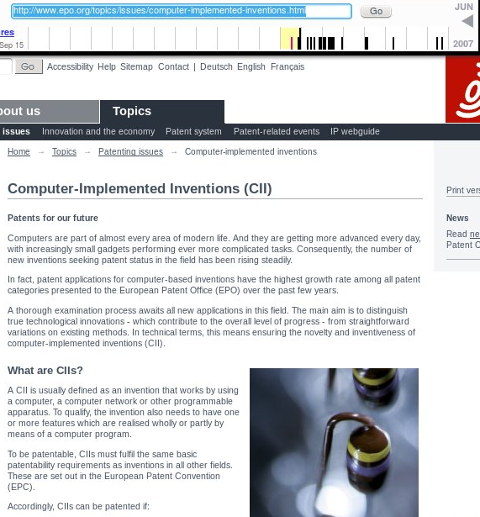
Summary: How the term CII, or computer-implemented invention, is used to bypass/avoid a meaningful debate about patents on abstract ideas and algorithms (software patents) even in 2016
TECHRIGHTS was created with software patents in mind. The activism was all along focused on the subject. But some pundits are still dodging the term “software patents” and instead saying “computer-implemented” (like CII). The EPO used to do this a lot. It misleads, sometimes intentionally. This happens a lot in the United States, where the USPTO now receives instructions which are increasingly hostile towards software patents because they are abstract..
“Just ascribing a “machine” (sometimes “device”) to some piece of code or combining code with a general-purpose computer oughtn’t make the algorithms suddenly patentable.”In Australia, in the mean time, efforts continue to achieve the unthinkable and make all software patentable. Mark Summerfield says that the “Australian Patent Office has recently issued two decisions resulting from applicants requesting to be heard following examination objections that their respective inventions did not constitute patent-eligible subject matter, i.e. a ‘manner of manufacture’ under the Australian patent law. Both decisions relate to electronic gaming machines (commonly known as ‘poker machines’ or ‘slot machines’), and both involve the question of whether particular computer-implemented features of such machines are patentable. They differ, however, in the outcome.”
The above says the word “software” not even once (and it’s a long article). It says “implemented” or “implementation” 15 times however.
Just ascribing a “machine” (sometimes “device”) to some piece of code or combining code with a general-purpose computer oughtn’t make the algorithms suddenly patentable. This is the kind of loophole embraced by the EPO and IPONZ, arguably in India as well.
Watch out for these dirty tricks. █
“[The EPO] can’t distinguish between hardware and software so the patents get issued anyway” —Marshall Phelps, Microsoft
Permalink
 Send this to a friend
Send this to a friend
07.30.16
Posted in Courtroom, Europe, Patents at 11:58 pm by Dr. Roy Schestowitz
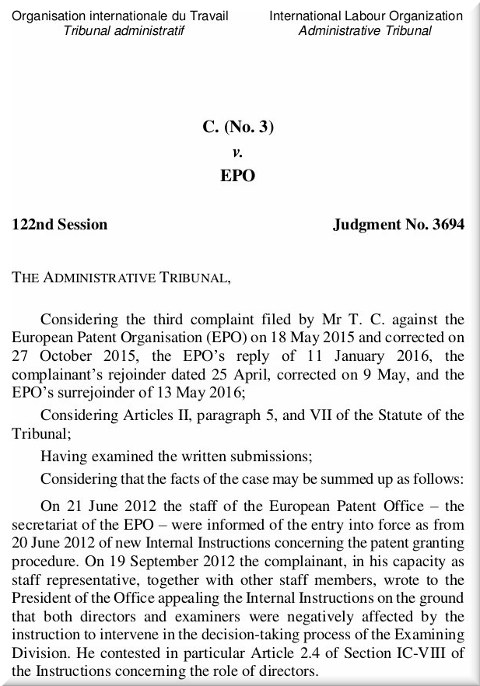
Summary: An unresolved complaint that says “both directors and examiners were negatively affected by the instruction to intervene in the decision-taking process of the Examining Division” and the Appeals Committee was stacked
TECHRIGHTS will soon present more and more evidence of dysfunction at Battistelli’s Office, which is turning from hero to zero in just a few years because of Battistelli’s misguided policies that severely damage patent quality and basically attack resistors at the cost of their human (and labour) rights.
We are still working on ‘examination’ of individual ILO cases, in order to help highlight what Battistelli has done to the EPO since staging a coup, leaving casualties wrestling for a place in ILO’s long queue. Over 80% of determinations end up against Battistelli, based on the latest round of decisions. We previously wrote about one’s assignment to a bogus role after elimination of auditory roles — a Željko Topić classic!
“For those wanting to see the ILO decisions,” wrote one person “go to http://www.ilo.org/dyn/triblex/triblexmain.showList?p_lang=en&p_session_id=122
“3694 and 3699 are worth looking at. ”
“Over 80% of determinations end up against Battistelli, based on the latest round of decisions.”“Judgements 3694 and 3699 actually show the problem with ILO,” wrote a person in response to this. “We have one administrator who was harassed and sacked for displeasing Battistelli… he got less than a month salary in damages. We have a problem with the internal appeal committee which composition is lacking, the office can redo the work. Consequence? Personal must wait another 4-6 years for a decision. The judgements are victories… but Pyrrhic ones. ”
We decided to reproduce the text below and add some highlights to it. We don’t know who T. C. (the complainant) is, as there’s nobody with the initial T. C. among the signatories here, so either the person is not in SUEPO/Central Staff Committee or is no longer at the EPO (after the infamous purges).
Organisation internationale du Travail
Tribunal administratif
International Labour Organization
Administrative Tribunal
C. (No. 3)
v.
EPO
122nd Session
Judgment No. 3694
THE ADMINISTRATIVE TRIBUNAL ,
Considering the third complaint filed by Mr T. C. against the European Patent Organisation (EPO) on 18 May 2015 and corrected on 27 October 2015, the EPO’s reply of 11 January 2016, the complainant’s rejoinder dated 25 April, corrected on 9 May, and the EPO’s surrejoinder of 13 May 2016;
Considering Articles II, paragraph 5, and VII of the Statute of the Tribunal;
Having examined the written submissions;
Considering that the facts of the case may be summed up as follows:
On 21 June 2012 the staff of the European Patent Office – the secretariat of the EPO – were informed of the entry into force as from 20 June 2012 of new Internal Instructions concerning the patent granting procedure. On 19 September 2012 the complainant, in his capacity as staff representative, together with other staff members, wrote to the President of the Office appealing the Internal Instructions on the ground that both directors and examiners were negatively affected by the instruction to intervene in the decision-taking process of the Examining Division. He contested in particular Article 2.4 of Section IC-VIII of the Instructions concerning the role of directors.
The Chairman of the Appeals Committee decided that his appeal would be dealt with in a summary procedure, pursuant to Article 9 of the Implementing Rules for Articles 106 to 113 of the Service Regulations for permanent employees of the Office. In its opinion of 16 December 2014 the Appeals Committee, composed of the Chairman and the two members appointed by the President of the Office (the two members who should normally be appointed by the Staff Committee had not been appointed), recommended rejecting the appeal as manifestly irreceivable as the complainant was challenging a general decision which did not directly and immediately affect him or the staff whose rights he sought to protect.
By a letter of 18 February 2015 the complainant was informed that the Vice-President of Directorate-General 4, acting with delegation of power from the President, had decided to endorse the Appeals Committee’s recommendation. That is the decision the complainant impugns before the Tribunal.
The complainant asks the Tribunal to declare both the opinion of the Appeals Committee and the impugned decision null and void. He asks the Tribunal to refer the appeal back to the Appeals Committee and to order it to “treat the appeal newly ab initio and in a new [...] composition”, without any of the members having taken part so far in the procedure. He also claims 50,000 euros in moral damages, plus costs. As “auxiliary requests”, he asks the Tribunal to order the EPO to declare that “interventions in the tasks vested to the Examining Divisions and Opposition Divisions by the [European Patent Convention], in particular any tasks of examination, are illegal”, and to require directors to withhold from actions that are ultra vires. He also asks the Tribunal to order the EPO to withdraw Article 2.4 of Section IC-VIII of the contested Internal Instructions, or subsidiarily that the EPO makes “available said Section to the public for example by publishing it in the official journal of the EPO”. He further claims moral damages in the amount of 100 euros for each director and examiner to whom the Internal Instructions apply.
In his rejoinder he modifies some of his claims and asks the Tribunal not to refer his case to the Appeals Committee, but to treat the case “newly from the beginning” and grant him an oral hearing. He also
asks to be given “another possibility for a rejoinder for providing evidence which could not have been submitted in the appeals procedure before the [Appeals Committee], as it did not treat the case substantially”.
The EPO was instructed by the President of the Tribunal to confine its submissions to the issue of the composition of the Appeals Committee. The EPO argues that the decision of the Appeals Committee to pursue its activity in a reduced composition was legal and legitimate.
CONSIDERATIONS
1. The complainant filed an appeal with the President of the Office on 19 September 2012 against the Internal Instructions on the patent granting procedure, contesting in particular Article 2.4 of Section IC-VIII of the Instructions concerning the role of directors. He was informed on 15 October 2014 that his appeal would be dealt with in a summary procedure, without hearing the parties, pursuant to Article 9 of the Implementing Rules for Articles 106 to 113 of the Service Regulations. The Appeals Committee was composed of the Chairman and the two members appointed by the President, as at that time the Staff Committee had not appointed the two members and two alternates as provided for in Article 111 of the Service Regulations and Article 5 of the Implementing Rules for Articles 106 to 113 of the Service Regulations. In the present complaint the complainant impugns the decision of the Vice-President of Directorate-General 4, acting with delegation of power from the President, to endorse the Appeals Committee’s recommendation to reject his appeal as manifestly irreceivable. The EPO was requested by the Tribunal to limit its reply to the issue of the composition of the Appeals Committee.
2. The complainant asks the Tribunal to set aside the impugned decision endorsing the Appeals Committee’s opinion, refer the appeal back to the Appeals Committee with a new composition and award the complainant moral damages and costs. The complainant also makes an auxiliary request that the EPO be ordered to withdraw Article 2.4 of Section IC-VIII of the Internal Instructions. He presented new claims
in his rejoinder, asking the Tribunal not to refer his case to the Appeals Committee but to examine it on the merits. However, the EPO was instructed to confine its submissions to the issue of the composition of the Appeals Committee. Consequently, these claims will not be considered.
As to the complainant’s request for oral proceedings, the Tribunal notes that the parties have presented their case extensively and comprehensively in their written submissions, which are sufficient to enable the Tribunal to reach a reasoned and informed decision on the only issue that must be determined at this stage. The request for oral proceedings is therefore rejected.
3. The grounds for complaint are that the Appeals Committee was improperly composed, as it did not include two members appointed by the Staff Committee, and that the Appeals Committee unlawfully applied the summary procedure retroactively, infringing the complainant’s right to be heard. In his rejoinder the complainant contested the merits of the Internal Instructions.
4. In its opinion dated 16 December 2014, the Appeals Committee recommended rejecting the appeal as irreceivable and held that the complainant could not appeal instructions which did not directly and immediately affect him or the staff whose rights he wished to protect as a member of the staff representation. The Appeals Committee attached to its opinion a “Decision on the composition of the Appeals Committee” in which it noted inter alia that the Chairman and the two members appointed by the President had decided to sit in a reduced composition because the Central Staff Committee, elected in June 2014, had not fulfilled its obligation under Article 36(2) of the Service Regulations and Article 5(4) of the Implementing Rules to Articles 106 to 113 of the Service Regulations to appoint its members to the Appeals Committee, which the Staff Committee was supposed to do by 1 October 2014 at the latest according to Article 17(1) of Administrative Council’s decision CA/D 2/14. Despite numerous written requests, this was not done. It further stated that “[w]ith a view to the non-appointment of members by the Central Staff Committee, the Appeals Committee in its aforementioned composition decided to nonetheless continue dealing with appeals.
Considering its ongoing responsibility to provide a means of legal redress, the Appeals Committee [felt] obliged, in the interest of the entire staff of the EPO, to continue hearing and deliberating appeals brought before it. The Appeals Committee [did] its utmost to shorten the length of proceedings and therefore [found] it legally unacceptable to suspend its work for an unknown duration.” The Appeals Committee cited Judgments 1838, under 16 and 17, 1767, under 12 and 13, and 1565, under 8, noting that the Tribunal had held that the refusal of staff representatives to participate in the work of a consultative committee neither disqualified that committee nor invalidated its recommendations, and that the refusal of the staff representatives to participate may not result in a veto right. The Appeals Committee, in its reduced composition, thus decided to continue to sit in order to hear appeals until a better solution could be found.
5. The Central Staff Committee, in a letter dated 3 October 2014, informed the President that appointing nominees to the Appeals Committee was “for the moment, [...] neither appropriate nor desirable”. It went on inter alia to “challenge the legality of changing the rules mid-term, with the specific purpose of causing replacement of the members nominated by the Staff Representation before their mandate expire[d]”; “challenge the legality of asymmetric appointments”; and to note “severe dysfunction in the way the [Appeals Committee’s] work is managed and the cases handled”. It also mentioned other issues of contention and requested a meeting with the President to discuss those issues.
6. The Tribunal notes that none of the cases cited by the Appeals Committee dealt with the composition of an internal appeal body. It also observes that considering the quasi-judicial functions of the Appeals Committee, its composition is fundamental and changing it changes the body itself. While it is true that the fundamental functions of that body must not be paralysed, it is also true that the body itself cannot be changed through a changed composition. The balance sought to be achieved by the composition of this body, which includes members appointed by the Administration and the staff representation, is a fundamental guarantee of its impartiality. That balanced composition is an essential feature
underpinning its existence. Without it, it is not the Appeals Committee. The case will therefore be sent back to the EPO so that the Appeals Committee, composed in accordance with the applicable rules, may examine the appeal. In the specific circumstances of this case, no award of moral damages will be made. The question of costs shall be reserved.
DECISION
For the above reasons,
1. The case is sent back to the EPO so that the Appeals Committee, composed in accordance with the applicable rules, may examine the appeal.
2. The claim for moral damages is dismissed.
3. The question of costs is reserved.
In witness of this judgment, adopted on 19 June 2016, Mr Giuseppe Barbagallo, Vice-President of the Tribunal, Mr Michael F. Moore, Judge, and Sir Hugh A. Rawlins, Judge, sign below, as do I, Andrew Butler, Deputy Registrar.
Delivered in public in Geneva on 6 July 2016.
GIUSEPPE B ARBAGALLO
MICHAEL F. MOORE
HUGH A. RAWLINS
ANDREW BUTLER
There are dozens more like the above complaint (and far more pending outcome, which can take years), but we are going to produce a summary/overview and deal with them in turn based on relevance, urgency, priority etc. █
Permalink
 Send this to a friend
Send this to a friend
Posted in America, Asia, Europe, Patents at 11:03 pm by Dr. Roy Schestowitz
Asia’s growing economy has turned the patent system against its creators
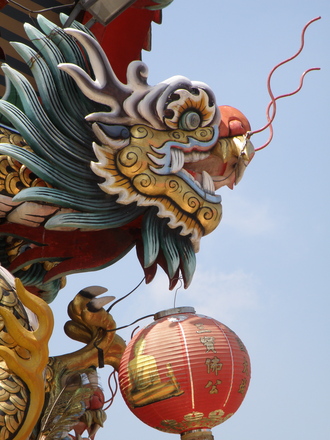
Summary: The giveaway of patents to the East, combined with the opportunistic (for patent lawyers) opening to patent litigation from the East, contradicts the very notion of patents as guardians of science and technology in the Western world
LIKE the EPO, here in the UK we have UK-IPO (or just IPO for short), whose record on software patenting we wrote a lot about 8 years ago, particularly in relation to a case of Nokia (or Symbian at the time). It often feels like the policy at the IPO is steered not by British interests but by a bunch of greedy patent lawyers, who are conveniently besieging the British industry for money derived from legal fees, not innovation, development and so on.
“It often feels like the policy at the IPO is steered not by British interests but by a bunch of greedy patent lawyers, who are conveniently besieging the British industry for money derived from legal fees, not innovation, development and so on.”Based on a sponsored ‘report’ from IAM the IPO gave a Patent Prosecution Highway to China, where patent quality is notoriously poor (probably worse than even at the USPTO). But don’t worry; when Chinese companies start going after British companies (as they increasingly do in the US and especially in Texas) the patent lawyers will be the ones pocketing lots of money.
Much of what we saw Battistelli doing with SIPO (China’s, not Croatia’s) is going to cost Europe a lot in the long run. As is apparent from Battistelli’s policies in a variety of areas, short-term thinking and temporary gains are a priority right now (must be ENA ‘logic’) as he won’t be around to pick up the pieces as everything start to rattle and break.
Looking at IAM this past week, patent armament is becoming somewhat of a thing and Asian countries (other than China) are now buying the West’s patents as a matter of strategy/policy. As IAM put it: “It is hard to think of a better example of the ‘transition state’ described by Komiya than Softbank’s recently announced $23 billion takeover bid for UK-based chip designer ARM. Here is a massive investment by a company which started as a traditional telecom into a foreign business that is built entirely on developing and licensing intellectual property. It has also been framed by Softbank chief Masayoshi Son as a major push into the Internet of Things, an area highlighted by Komiya in his address as an “urgent challenge” for Japanese companies to adapt to if they want to remain competitive in the high-tech space. [...] Whether in the form of IP-focused acquisitions like the ARM deal or licensing campaigns like that pursued by IP Bridge, the gradual shift in the Japanese IP environment looks set to continue.”
“Huawei (China) is already using its patents to go after companies in the US, not just in Korea.”ARM makes a lot of its money from licensing, not production. So we can expect money to flow to Asia, not only for production but also for patents. Where does this leave the bubble or the illusion that using patents we can still maintain economic might (while outsourcing all production to the East)? According to Neil Wilkof, patent litigation is becoming somewhat a branding tool. Citing the Huawei v Samsung case (Wilkof’s colleague, Darren Smyth, wrote about Hospira v Genentech, which is less relevant to us), he writes: “Provided that the U.S. law suit does not go the way of the Apple-Samsung dispute, and Huawei is viewed as overplaying its IP hand, or otherwise is seen in a negative light, there is the potential for substantial upside in brand recognition of its smartphones in the vast U.S. market. Indeed, such a benefit may ultimately be much more significant for the company than matters of injunctions and monetary damages. Indeed, patent litigators might consider taking a program or two at their local school of management to learn more about the dynamics of brand-building, and how patent litigation can contribute to this process.”
Huawei (China) is already using its patents to go after companies in the US, not just in Korea. Apple’s patent feuds with Samsung have just made headlines in Western media, saying that “Apple Inc (AAPL.O) on Friday asked the U.S. Supreme Court to clear the way for the iPhone maker to secure hundreds of millions in damages from Samsung Electronics Co Ltd (005930.KS) in a case over smartphone design patents.
“The world’s top smartphone rivals have been feuding over patents since 2011, when Apple sued Samsung in a northern California court alleging infringement of the iPhone’s patents, designs and trademarked appearance.”
“We need to reassess the motivation/s of patent maximalism and rethink the laws; the same goes for copyright in the Internet era, but for different reasons.”Apple’s market share in phones has just fallen more than 20% (see our daily links). Apple distracts from that by stating it sold a billion ‘i’ phones, but numbers suggest that Android OEMs like Huawei and Samsung is where most of the action (even growth) is. Whether Western companies can at all remain competitive — even with lots patents at hand — remains questionable. Asia is now turning the West-leaning patent system against the West, so patent maximalism in its own right won’t be sufficient for maintaining Western dominance. Only patent law firms would gain. I am not personally prejudiced against east Asia (my wife in fact is east Asian), but repeating the old talking points about the essence of patents for “countering Asia” is doing a disservice to truth itself. We need to reassess the motivation/s of patent maximalism and rethink the laws; the same goes for copyright in the Internet era, but for different reasons.
As is noted in more and more sites, China is now exploiting the same loopholes previously enjoyed mostly by patent trolls. This will only get worse in years to come. █
Permalink
 Send this to a friend
Send this to a friend
« Previous Page — « Previous entries « Previous Page · Next Page » Next entries » — Next Page »

























 Content is available under CC-BY-SA
Content is available under CC-BY-SA